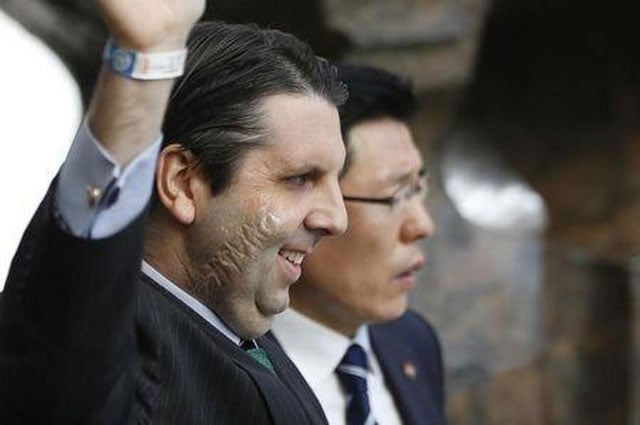
Prosecutors had sought a 15-year sentence for Kim Ki-Jong, 56, who lunged at Mark Lippert with a paring knife during a breakfast function in Seoul last March.
In accepting the attempted murder charge, the Seoul Central District Court cited medical reports showing Kim had come close to severing the carotid artery in Lippert's neck.
It also noted that the defendant had "shown no repentance, attempting to justify his actions throughout the trial".
The public attack on the envoy of South Korea's most important military and diplomatic ally — and dramatic TV footage of Lippert being rushed to hospital clutching his bloodied face — was shocking for a country where passionate political protest is common but acts of such extreme violence rare.
There was also a degree of shame and disquiet that a man with a record of violence against foreign envoys had been able to carry out such an assault.
A maverick activist who was known to police, Kim had been handed a two-year suspended sentence in 2010 for hurling a rock at the then Japanese ambassador to Seoul.
The defendant, wearing a blue prison outfit, closed his eyes but showed little emotion as the court verdict was read out.
He was then taken from the court in a wheelchair he has been using as the result of a leg injury sustained while being tackled to the ground after the assault.
It was not immediately clear if his defence team would appeal the ruling.
Under police questioning, Kim said Lippert had been the "symbolic" target of his opposition to annual US-South Korea military exercises.
The joint drills always trigger a surge in tensions with North Korea and Kim argued they were responsible for blocking a resumption of inter-Korean dialogue.
While admitting the assault, Kim repeatedly denied any intent to kill the ambassador, insisting that his sole aim was to bring attention to his campaign against the military exercises.
The court acquitted Kim of separate charges filed under South Korea's strict National Security Law that bans any act seen as aiding North Korea or promoting its ideology.
Prosecutors said they would appeal that decision.
Kim has visited the North seven times and once tried to erect a memorial in Seoul to the late North Korean leader Kim Jong-Il after his death in 2011.
North Korea rejected accusations that it may have been behind the attack on Lippert as a "vicious" smear campaign, although the official KCNA news agency described the assault as "just punishment" for Washington's refusal to cancel the joint military drills.
Lippert underwent two-and-a-half hours of surgery after the attack. While there was no irreversible nerve damage to his face, a separate cut to his left hand had damaged the nerves of his little finger.
Lippert took up his role as ambassador in October 2014, and became a popular envoy, tweeting regularly about his life in Seoul and setting up a tongue-in-cheek Twitter account for his dog, Grigsby.
His wife gave birth in Seoul and the couple gave their son a Korean middle name.
After the attack, well-wishers flooded Lippert's blog and Twitter account with messages of sympathy, support and apology.









1736939933-0/sidra--(8)1736939933-0-270x192.webp)

1732012115-0/Untitled-design-(14)1732012115-0-270x192.webp)
1736844405-0/Express-Tribune-(2)1736844405-0-270x192.webp)










COMMENTS
Comments are moderated and generally will be posted if they are on-topic and not abusive.
For more information, please see our Comments FAQ